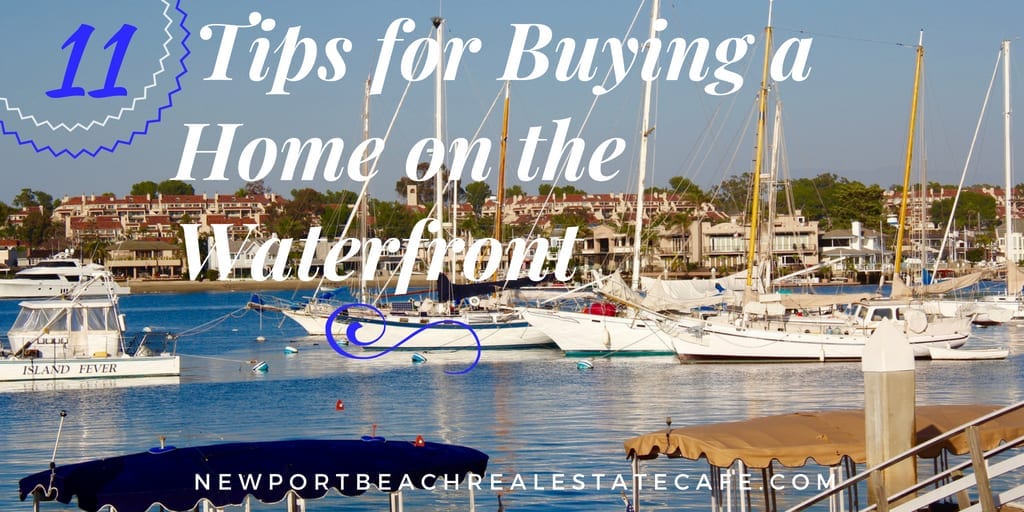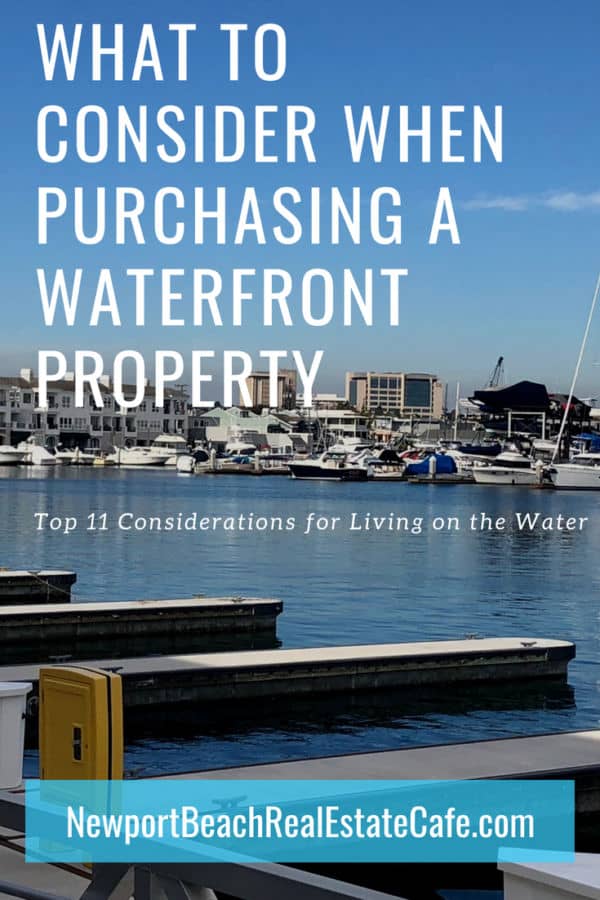Waterfront property is highly desirable. The home buying process always feels needlessly complex, but buying highly-coveted waterfront property can prove to be even more arduous. If you’re looking to buy a home on the water, here are 11 things you should know first.
When you live on the water, it can feel like a vacation every day. The sound of waves, the smell of the sea — there’s nothing quite like it.
It’s no surprise, then, that many people desire waterfront property. Many of us dream of having a beachfront property for entertaining family, enjoying water recreation opportunities, or simply enjoying our morning coffee on our porch overlooking the ocean.
However, waterfront property is unique in many ways, and there is more to consider prior to choosing your dream home. If you’re considering buying or investing in a property on the water, here are 11 points to keep in mind.

1) Choose the Right Agent
Buying waterfront real estate can seem daunting. It can have different rules, regulations, and considerations than properties that aren’t waterfront.
Choosing the right agent for your waterfront property search is imperative. Find an agent who is familiar with the local regulations, who knows the area in which you hope to buy, and who frequently lists and sells other waterfront properties.
2) Ask About the Bulkheads
If the property you’re considering is oceanfront, it may well have bulkheads — stone or rock barriers that separate your home from the water.
Depending on the regulations in your area, the homeowner might be responsible for the upkeep of these bulkheads. Before you buy, hire an inspector who specializes in these. He or she should be able to tell you if they will need costly repairs soon.
It’s also smart to factor the cost of routine upkeep of the bulkheads into your budget when home shopping. In southern California, some oceanfront properties have seawalls due to a bluff failure. You definitely want to meet with a coastal engineer to look at the seawall during your waterfront property inspection and due diligence period.
3) Consider the Cost of Flood Insurance
Water is wonderful, but not when it unexpectedly appears in your basement. If you’re buying a home on the water, it’s quite likely that you will need flood insurance to protect your home and belongings should the worst happen.
Flood insurance can be pricey. Avoid “sticker shock” by shopping around and exploring your options before you make any offers.
4) Research the Taxes
In general, the property taxes on a waterfront home will be higher. The demand for these properties drives up home values which can, in turn, increase the property owners’ tax burden.
Before you buy, do your due diligence by researching the tax history of the property you’re considering. You can also contact the local tax assessor for additional resources.
5) Scrutinize the Shoreline
The shoreline is another key detail in your hunt for the perfect property.
Rising tides, storms, erosion, and just the constant movement of water can change the shoreline over time. Before buying, learn what changes have been taking place on the property you’re considering.
A great way to do this would be to talk to adjacent neighbors. Ask them what, if any, changes they’ve seen in their shorelines. Find out if water levels have been receding or rising. This should give you a better indication of what the shoreline will be like in the next several years.
6) Learn What Improvements You Can (or Can’t) Make
Shores maintain a balance between earth and water, and seemingly small changes to a property can have wide-ranging effects on the delicate ecosystem.
Waterfront properties can have strict regulations regarding the type of construction and development that can take place. Sometimes, even the removal of shoreline vegetation can be regulated.
Contact local, state, and federal agencies before you make an offer to learn what you can and cannot do with the property. Don’t assume you can add an addition later or build a large new dock — do your homework before buying so you’re not in for an unwelcome surprise later.
7) What About the Water?
Not all shorelines or bodies of water are created equal. Before you buy, consider your intended uses for your property.
Do you plan to kayak? Fish? Dock a boat? Is the shoreline rocky? Is it overgrown? Make sure the area in which you buy, the body of water, and the type of shoreline support your intended uses.
It’s also a good idea to find out what else is on the water in your intended neighborhood. If peace and quiet are paramount, you don’t want your dock a stone’s throw from a raucous resort or speedboat rental facility.
8) Think About the Mortgage
In general, beachfront homes are more expensive. More expensive homes mean larger loans.
Start your mortgage shopping early. Get the right preapprovals. Larger loans can require a good amount of documentation and take longer to receive. The sooner you have the financials in order, the sooner you can make an offer on your dream property.
9) Remember — Water Isn’t Private
Water isn’t private property. Your private property will likely end at the highest tide line, so it’s smart to find out exactly where that is.
Make sure you’re ok with kayakers, jet skiers, or even swimmers in close proximity to your shoreline and dock.
10) Research the HOA
Will the waterfront property you’re dreaming of be part of a homeowner’s association? If so, find out in advance what fees and regulations are in place. HOAs can govern landscaping, the color of your home exterior, yard signage — even vegetable gardens. Make sure you’re ok living with the regulations before you buy.
Some waterfront properties are also subject to an association. If you plan to purchase a waterfront property that is part of an association, learn beforehand what this will mean for you in terms of fees and rules.
11) Special Considerations for New Builds
Water is hard on structures. Oceanfront homes take a beating from sand, wind, salt, and moisture. If you plan to buy the property and build new, be sure to discuss with your builder what types of materials are used to ensure your home can withstand the location.
It’s also wise to consider floodplains and the potential for erosion when choosing the right property on which to build.
Are You Ready to Buy Your Waterfront Property?
Despite the additional considerations to take into account, buying or investing in a waterfront property is a wonderful idea for many families. The beauty, serenity, and recreational opportunities simply cannot be beaten.
Connect with our site for more tips, resources, and information for finding your dream property — no matter your lifestyle!
Joy Bender is a co-founder of Aumann Bender & Associates in San Diego. Her team represents extraordinary homes in a variety of lifestyle categories and price points. Joy helps real estate professionals learn how to create real estate digital marketing to generate leads, learn about breaking into the high end of their market, and about selling to the affluent in her free Facebook Group search: Selling Luxury – Digital Marketing.
